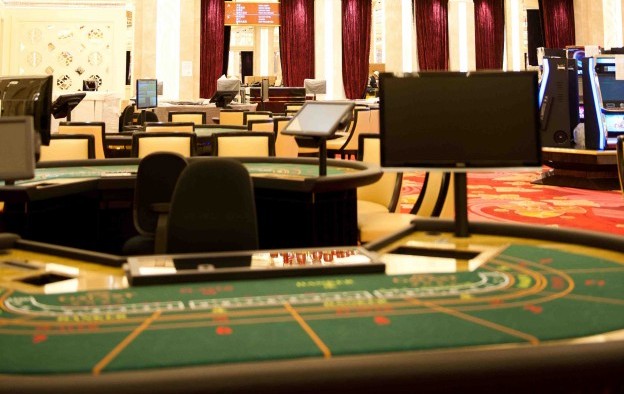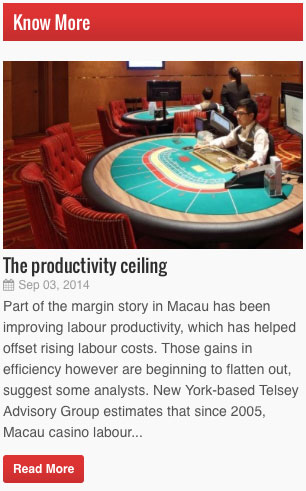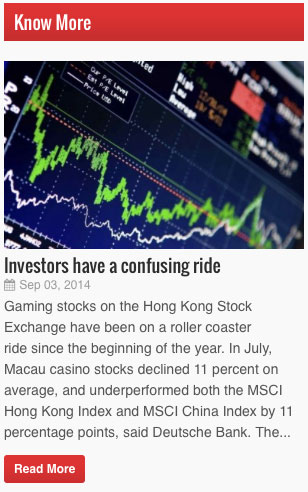Labour pains: Macau casinos squeezed by local conditions
Sep 03, 2014 Newsdesk Features, Latest News, Macau

Labour issues – relating to shortage of supply, wage demands and subsequent higher costs – are putting pressure on Macau’s casino operators. They are competing for new workers and offering better terms to the experienced ones they already have, in preparation for the big Cotai resort openings between 2015 and 2017.
A number of gaming analysts said the increase in staff costs seen this year was earlier than investors had expected. Some analysts have warned that development might have a noticeably negative effect on margins.
Second quarter earnings season for Macau operators was “disappointing”, Karen Tang, Hong Kong-based analyst at Deutsche Bank AG, wrote in a report last month. “The key reason was higher staff retention costs,” she added.
Las Vegas Sands Corp, parent of Macau operator Sands China Ltd, said in its second quarter earnings statement that a new bonus programme for non-management employees in Macau negatively affected its results “by approximately US$29 million”.
However, Kenneth Fong of Credit Suisse AG in Hong Kong said in a note on Tuesday that the impact of labour shortages on margins and on earnings in the future might not be as severe as the market feared.
 He cited several reasons. One was that staff retention programmes launched in the first half of 2014 already cover the period from 2014 through to 2017.
He cited several reasons. One was that staff retention programmes launched in the first half of 2014 already cover the period from 2014 through to 2017.
He added some casino operators were freezing recruitment as revenue growth slowed, and suggested that “moderating revenue growth should prompt operators to aggressively revisit their cost structures, benefiting margins”.
“Even if we were to conservatively assume no revenue growth but a 10 percent staff cost increase in 2015, the impact would be likely to be around 3 percent to 4 percent of earnings,” wrote Mr Fong.
But Christopher Jones of U.S.-based Telsey Advisory Group, told GGRAsia: “Separating out planned and unplanned labour increases is tough. We suspect that higher labour costs could cost the companies 1 percent to 2 percent in margin, which is very significant.”
Galaxy Entertainment Group Ltd’s deputy chairman Francis Lui Yiu Tung said at a first half earnings press conference on August 19 that rising labour costs could cut the company’s profit margin by between 1 percent and 1.5 percent.
Deutsche Bank’s Ms Tang had written in a July note that the increase in average casino worker salaries would “likely have a 50 bps [basis points] to 70 bps impact on margins, depending on the VIP versus mass mix of different operators”.
She added: “We expect margin expansion from favourable mix shift from VIP to mass will be diluted.”
More people, more cost
Macau casino executives and investors acknowledge that the local labour shortage presents major challenges operationally and in terms of overheads.
Sands China’s market rivals Wynn Macau Ltd, Melco Crown Entertainment Ltd, Galaxy Entertainment Ltd, MGM China Holdings Ltd and SJM Holdings Ltd have each said they will need more than 8,000 extra workers each for their new properties on Cotai.
Melco Crown’s Studio City and Galaxy Macau’s phase 2 are already hiring workers to fill positions at their new or expanded casino resorts, both scheduled to open next year.
Jiji Tu, managing director of Macau-based human resources company MSS Recruitment Ltd, said casino operators are feeling the pinch of an acute shortage of labour in the city.
Despite the urgent need to hire employees across all segments, Ms Tu does not expect companies to fork out millions more in benefits for employees in the near term. “At least for one year or so,” she told GGRAsia.
Higher wages
Full-time employees in Macau’s gaming industry totalled 56,700 people at the end of the second quarter of 2014, accounting for 14.5 percent of the city’s workforce.
 The role of casino table dealer, a position only open to Macau permanent residents, accounted for 45.4 percent of all employees in the casino sector as of June 30, according to government data.
The role of casino table dealer, a position only open to Macau permanent residents, accounted for 45.4 percent of all employees in the casino sector as of June 30, according to government data.
The average monthly earnings for dealers at Macau casinos had increased by 4.8 percent year-on-year to MOP17,530 (US$2,196) as of the end of June this year.
The growth in dealer wages however is lagging the rise in consumer price inflation. The composite consumer price index went up nearly 6 percent year-on-year in June, mainly attributable to “higher rentals for dwellings and dearer charges for eating out”, said the Macau’s Statistics and Census Bureau.
The city’s unemployment rate stood at 1.7 percent at the end of July, a level considered statistical full employment in most economies.
As competition for workers intensifies amongst all Macau businesses, casino worker wages in particular are likely to rise rapidly, say some analysts.
Mr Jones of Telsey said labour cost increases are expected “in the mid to high teens”, though it might vary between operators.
“We expect operators with stronger growth to see higher labour costs increases, as they ‘buy into’ the stronger revenue trends,” Mr Jones told GGRAsia.
Deutsche Bank’s Ms Tang said that pay rises – in addition to the usual annual salary raise and bonus of one month of salary per year – coupled with the casinos’ recently announced enhanced programmes for staff retention – “will lift labour cost inflation from 5 percent to 8 percent per annum previously to 10 percent to 15 percent per annum in 2014-17”.
Overheads build
In its interim earnings report, Galaxy Entertainment said employee benefit expenses increased by 15 percent year-on-year to HKD2.5 billion (US$322.6 million) in the first half of 2014.
MGM China reported in August that staff costs increased by 18.5 percent year-on-year to HKD970.4 million for the six months ended June 30. Employee expenses at Wynn Macau rose to HKD1.5 billion in the first six months of 2014, up 28.8 percent from a year earlier.
SJM Holdings said staff costs, including share-based payments, rose by 16 percent year-on-year to HKD2.9 billion in the same period.
In its interim results, Sands China said employee benefit expenses increased to US$529.6 million in the first half of the year, more than 20 percent higher than a year earlier.
Increased staff compensation and retention programmes weighed on Melco Crown’s second quarter results, with the company citing US$10 million of higher labour expenses for the three months to June 30.
Labour unrest
With labour scarcity comes increasing confidence among resident workers that they can drive a harder bargain with employers.
Investment bank Morgan Stanley forecasts that labour demand for the city’s casino resorts will rise by 38 percent between 2014 and 2017. Barclays Bank Plc said in a note last month that casinos in Macau will need about 55,500 workers from 2015 onwards – between 14,000 and 17,000 of these for dealer positions, based on the assumption that the new casinos receive about 400 tables each.
Despite the higher pay and boosted benefits, many casino workers appear not to be satisfied and have taken to the streets in recent weeks. Police estimated that a march in downtown Macau on August 25 brought 1,400 people people to the streets demanding better pay and working conditions. The demonstration was organised by the Forefront of the Macao Gaming, an association that claims to be an umbrella group representing workers from different casino operators.
The labour activist group, which has been successful in organising several street demonstrations, is calling for a 10-percent salary increase across the casino industry to non-managerial positions, especially for dealers.
The group on Saturday organised a work-to-rule protest by casino staff at SJM Holdings’ Grand Lisboa property. Forefront of the Macao Gaming claimed the action was supported by 1,000 company staff.
Cloee Chao, secretary general of the association, told GGRAsia that the protests would continue because “casino employees, especially dealers, are very angry with the current working environment”.
Different operators have claimed that the labour group does not represent their workers. SJM Holdings’ chief executive Ambrose So Shu Fai has said that the activist outfit did not have “sufficient legitimacy” to make any demands.
Sands China said on August 7, after the same activist group organised a protest outside the firm’s Sands Macao property, that “anyone from outside the company claiming credit for anything that happens in terms of the company’s compensation is simply trying to deceive team members and the Macau community”.
Related articles
-
 Macau overseas visitors top 2.1mln in...
Macau overseas visitors top 2.1mln in...Dec 19, 2024
-
 Macau 2025 GGR, EBITDA to grow by...
Macau 2025 GGR, EBITDA to grow by...Dec 18, 2024
More news
-
 TCS John Huxley installs Roulette Xtra...
TCS John Huxley installs Roulette Xtra...Dec 19, 2024
-
 Macau eyes 233pct jump in 2025 junket...
Macau eyes 233pct jump in 2025 junket...Dec 19, 2024
Latest News
Dec 19, 2024
The number of visitor arrivals to Macau in the first 11 months of 2024 reached nearly 31.89 million, up 26.2 percent from the prior-year period, according to data published on Thursday by the...Sign up to our FREE Newsletter
 (Click here for more)
(Click here for more)
Pick of the Day
US$12.5 million
Amount the Macau government expects to collect from taxes on commissions paid by casinos to junkets in 2025
Most Popular
 Macau eyes 233pct jump in 2025 junket commission tax take December 19, 2024
Macau eyes 233pct jump in 2025 junket commission tax take December 19, 2024  Licensed POGO shutdown orderly: Pagcor chief December 19, 2024
Licensed POGO shutdown orderly: Pagcor chief December 19, 2024  New LMG stadium goes live at Grand Lisboa casino December 18, 2024
New LMG stadium goes live at Grand Lisboa casino December 18, 2024  Thomas Arasi retires as president, COO of Bloomberry December 17, 2024
Thomas Arasi retires as president, COO of Bloomberry December 17, 2024









